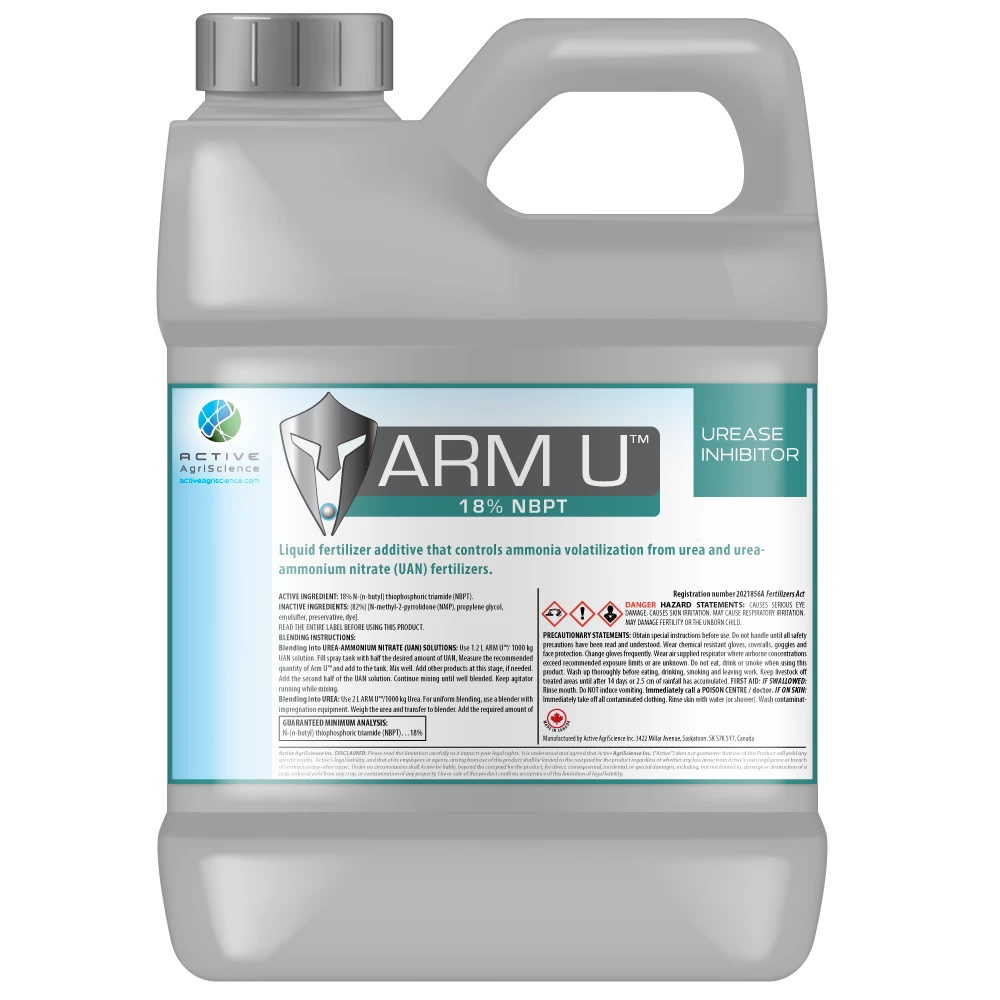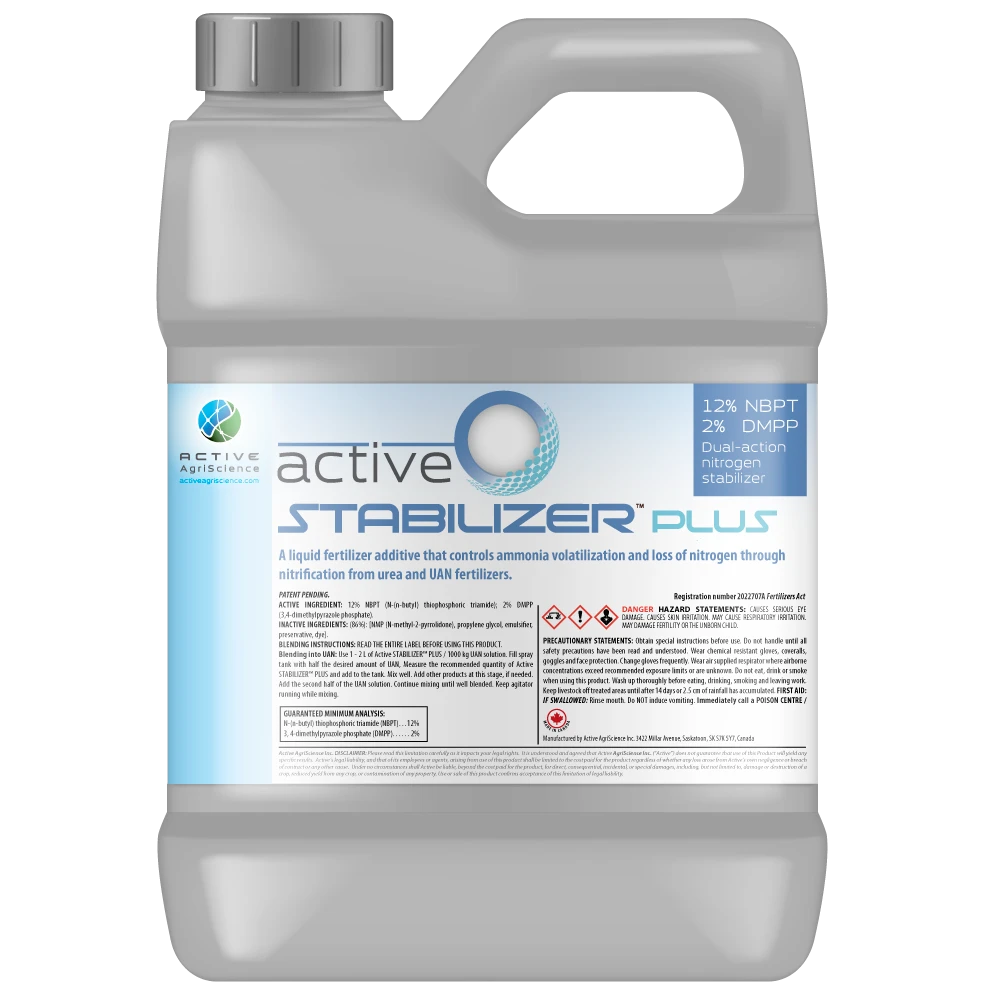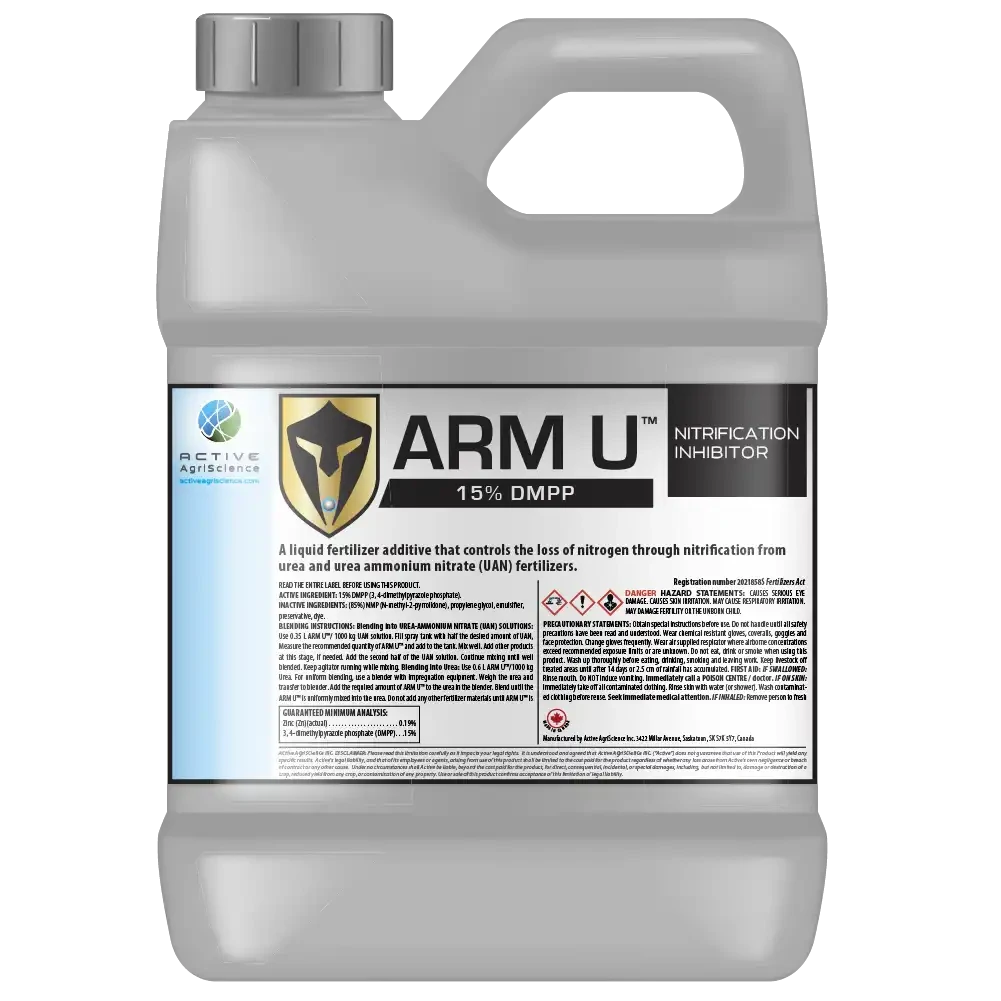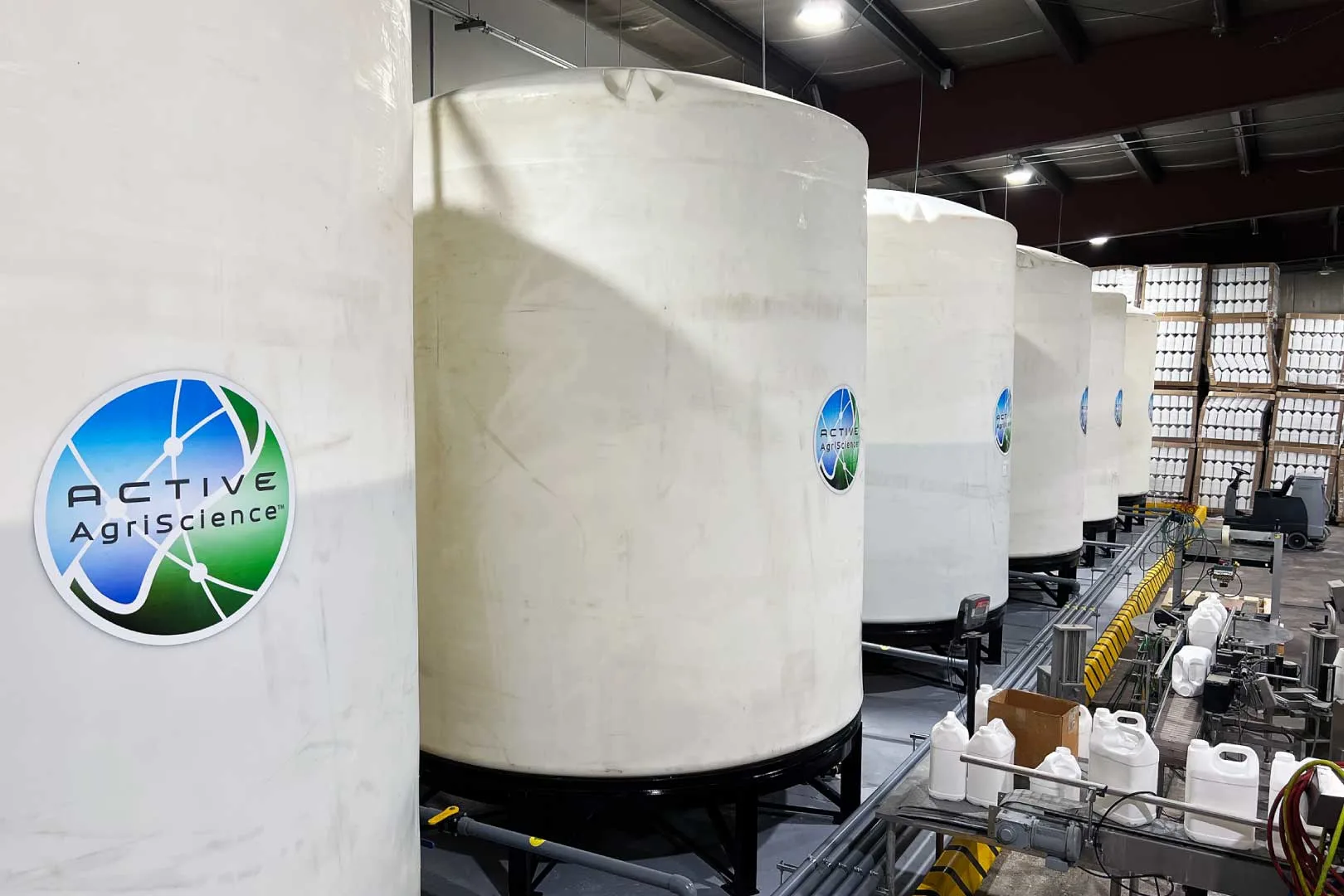
ARM U™ 18% NBPT
ARM U™ 18% NBPT is an NBPT based fertilizer additive that allows plants to absorb a greater amount of nitrogen which otherwise disappears too quickly through conversion to ammonia gas.

ARM U™ 18% NBPT is an NBPT based fertilizer additive that allows plants to absorb a greater amount of nitrogen which otherwise disappears too quickly through conversion to ammonia gas.
*Taurus Ag markets Active AgriScience products in Canada.
ARM U™ 18% NBPT is an NBPT based fertilizer additive that allows plants to absorb and utilize nitrogen efficiently, which otherwise disappears too quickly through conversion to ammonia gas.
Whenever urea or UAN fertilizer is applied to soil.
Nitrogen is essential for plant life and growth and is therefore a component of many fertilizers. However, up to 50% of the nitrogen applied as soil fertilizer is unavailable to plants because it is quickly converted to ammonia gas and released into the atmosphere. ARM U 18% NBPT inhibits this enzymatic process, allowing nitrogen to be absorbed through the plant roots.
Unlike other NBPT formulations, ARM U 18% NBPT is patented and an improved formulation that contains polymers (spreader molecules) that increase NBPT’s binding rates to urease enzyme leading to improved NBPT activity. This increased activity enables a lower active ingredient and a lower use rate. In addition, ARM U 18% NBPT is formulated to have a high buffering capacity to keep the solution pH below 7 and to protect and fully utilize the nitrogen present in the NBPT molecule.
ARM U 18% NBPT contains N-(n-butyl) thiophosphoric triamide (NBPT), which inhibits the urease enzyme activity that produces ammonia gas. By minimizing volatilization loss, plants have the opportunity to absorb and utilize the nitrogen necessary for photosynthesis and production of protein.
While Active AgriScience stands behind the quality of our products (see guarantee below), Active AgriScience cannot guarantee the same, or similar, yield results due the effects of variables outside of our control (soil conditions, weather, pests, diseases, tank mix partners, application rates, and errors in mixing and application). We encourage all prospective customers to run trials of our products before broad acreage adoption.
Active AgriScience 100% guarantees the quality of its products with a 15-month free replace warranty*. To aid consumers to make informed purchasing decisions all Yield Data posted on our Website and App is from Certified 3rd Party Tests.
*Improper use and/or storage, as per label instructions, voids the warranty. Product must be stored out of direct sun light within a temperature range of 5 – 35°C. Warranty is limited to the cost of the product and may be satisfied by free replacement of defective product, a credit note or refund (at the discretion of Active AgriScience Inc).
18% NBPT
UREASE INHIBITOR
A liquid fertilizer additive that controls ammonia volatilization from urea and urea ammonium nitrate (UAN) fertilizers.
ACTIVE INGREDIENT: 18% N-(n-butyl) thiophosphoric triamide (NBPT).
INACTIVE INGREDIENTS: (82%) [N-methyl-2-pyrrolidone (NMP), propylene glycol, emulsifier, preservative, dye]
READ THE ENTIRE LABEL BEFORE USING THIS PRODUCT.
BLENDING INSTRUCTIONS:
Blending into UREA-AMMONIUM NITRATE (UAN) SOLUTIONS: Use 1.2 L ARM U™/ 1000 kg UAN solution. Fill spray tank with half the desired amount of UAN, Measure the recommended quantity of Arm U™ and add to the tank. Mix well. Add other products at this stage, if needed. Add the second half of the UAN solution. Continue mixing until well blended.
Blending into UREA: Use 2 L ARM U™/1000 kg Urea. For uniform blending, use a blender with impregnation equipment. Weigh the urea and transfer to blender. Add the required amount of ARM U to the urea in the blender. Blend until the ARM U™ is uniformly mixed into the urea. Do not add any other fertilizer materials until ARM U™ is thoroughly distributed. If mixture appears wet or sticky, a drying agent may be added at this time.
NOTE: Density=9 lb per gallon (1.07 grams / cubic centimeter) at 20°C.
GUARANTEED MINIMUM ANALYSIS:
DANGER HAZARD STATEMENTS:CAUSES SERIOUS EYE DAMAGE. CAUSES SKIN IRRITATION. MAY CAUSE RESPIRATORY IRRITATION. MAY DAMAGE FERTILITY OR THE UNBORN CHILD.
Registration number 2021856S Fertilizers Act
PRECAUTIONARY STATEMENTS: Obtain special instructions before use. Do not handle until all safety precautions have been read and understood. Wear chemical resistant gloves, coveralls, goggles and face protection. Change gloves frequently. Wear air supplied respirator where airborne concentrations exceed recommended exposure limits or are unknown. Do not eat, drink or smoke when using this product. Wash up thoroughly before eating, drinking, smoking and leaving work. Keep livestock off treated areas until after 14 days or 2.5 cm of rainfall has accumulated.
FIRST AID: IF SWALLOWED: Rinse mouth. Do NOT induce vomiting. Immediately call a POISON CENTRE / doctor. IF ON SKIN: Immediately take off all contaminated clothing. Rinse skin with water (or shower). Wash contaminated clothing before reuse. Seek immediate medical attention. IF INHALED: Remove person to fresh air and keep comfortable for breathing. Immediately call a POISON CENTRE / doctor. IF IN EYES: Immediately flush eyes with a gentle stream of water for 15 minutes while holding the upper and lower eyelids open. Remove contact lenses, if present and easy to do. Seek immediate medical attention.
STORAGE: KEEP OUT OF REACH OF CHILDREN. Store locked up in a cool, dry, well ventilated area away from food or feed storage. DO NOT FREEZE.
DISPOSAL: Dispose of this product and its container in accordance with Federal, Provincial, and Local regulations.
FOR CHEMICAL EMERGENCY: Call +1 855-237-5573 and refer to SDS.
WARRANTY AND CONDITIONS OF SALE: Manufacturer warrants that this material conforms to the chemical description hereon and is reasonably fit for use as directed. No other warranty is made, either expressed or implied.
For Product Inquiries call 1-639-398-0485 or visit activeagriscience.com.
Manufactured by Active AgriScience Inc.: 3422 Millar Avenue, Saskatoon, SK S7K 5Y7, Canada
Active AgriScience Inc. DISCLAIMER: Please read this limitation carefully as it impacts your legal rights. It is understood and agreed that Active AgriScience Inc. (“Active”) does not guarantee that use of this Product will yield any specific results. Active’s legal liability, and that of its employees or agents, arising from use of this product shall be limited to the cost paid for the product regardless of whether any loss arose from Active’s own negligence or breach of contract or any other cause. Under no circumstances shall Active be liable, beyond the cost paid for the product, for direct, consequential, incidental, or special damages, including, but not limited to, damage or destruction of a crop, reduced yield from any crop, or contamination of any property. Use or sale of this product confirms acceptance of this limitation of legal liability.
Net weight:
10.7 kg (23.6 lbs)
Net contents:
10 L (2.6 gal)
| TREATMENT | Untreated Urea | Urea + ARM U |
|---|---|---|
| 2 YEAR AVG. NH3 LOSS (kg of N/ha) | 16.6 | 4.7 |
| % LOSS REDUCTION | 72.0 | |
| 2 YEAR AVG. YIELD (bu/acre) | 42.3 | 47.2 |
| % CHANGE | 11.6 |
| TREATMENT | Untreated UAN | UAN + ARM U |
|---|---|---|
| 2 YEAR AVG. NH3 LOSS (kg of N/ha) | 7.3 | 3.2 |
| % LOSS REDUCTION | 56.2 | |
| 2 YEAR AVG. YIELD (bu/acre) | 45.8 | 49.6 |
| % CHANGE | 8.2 |
| TREATMENT | Untreated Urea | Urea +ARM U |
|---|---|---|
| 2 YEAR AVG. NH3 LOSS (kg of N/ha) | 16.3 | 3.4 |
| % LOSS REDUCTION | 79.3 | |
| 2 YEAR AVG. YIELD (bu/acre) | 46.4 | 51.4 |
| % CHANGE | 10.8 |
| TREATMENT | Untreated Urea | Urea + ARM U |
|---|---|---|
| BANDED TOTAL NH3 LOSS (kg N/ha) | 16.6 | 1.1 |
| % LOSS REDUCTION | 93.1 | |
| BROADCAST TOTAL NH3 LOSS (kg N/ha) | 19.2 | 3.4 |
| % LOSS REDUCTION | 82.4 |
| TREATMENT | Untreated UAN | UAN + ARM U |
|---|---|---|
| BANDED TOTAL NH3 LOSS (kg N/ha) | 3.3 | 0.5 |
| % LOSS REDUCTION | 85.8 | |
| BROADCAST TOTAL NH3 LOSS (kg N/ha) | 2.8 | 1.7 |
| % LOSS REDUCTION | 39.7 |
Compatible with urea, urea ammonium nitrate and other urea based fertilizers.
| SECTION 1 – CHEMICAL PRODUCT AND COMPANY IDENTIFICATION | |
| PRODUCT IDENTIFIER | ARM U 18% NBPT |
| PRODUCT USE | Liquid nitrogen stabilizer for urea/UAN fertilizers |
| MANUFACTURERS NAME | Active AgriScience Inc. |
| ADDRESS | 3422 Millar Avenue Saskatoon S7K 5Y7 Saskatchewan, Canada |
| EMERGENCY TELEPHONE | +1 855-237-5573 |
| DATE | August 12, 2025 |
| PREPARED BY | Active AgriScience Inc. |
| USE RESTRICTIONS | For professional use only. Use only as labeled. |
| SECTION 2 – HAZARDS IDENTIFICATION | |
| GHS CLASSIFICATION | |
| HPR (WHMIS 2015) | Eye Damage / Irritation: Category 1 Skin Corrosion / Irritation: Category 2 Specific Target Organ Toxicity (STOT); Single exposure: Category 3 (respiratory irritation) Specific Target Organ Toxicity (STOT); Single exposure: Category 2 (kidneys) Reproductive toxicity: Category 1B |
| OSHA Hazard Communication Standard (29 CFR 1910.1200) | Eye Damage / Irritation: Category 1 Skin Corrosion / Irritation: Category 2 Specific Target Organ Toxicity (STOT); Single exposure: Category 3 (respiratory irritation) Specific Target Organ Toxicity (STOT); Single exposure: Category 2 (kidneys) Reproductive toxicity: Category 1B |
DANGER |
HAZARD STATEMENTS: CAUSES SERIOUS EYE DAMAGE. CAUSES SKIN IRRITATION. MAY CAUSE RESPIRATORY IRRITATION. MAY DAMAGE FERTILITY OR THE UNBORN CHILD. PRECAUTIONARY STATEMENTS: Obtain special instructions before use. Do not handle until all safety precautions have been read and understood. Wear chemical resistant gloves, coveralls, goggles and face protection. Change gloves frequently. Wear air supplied respirator where airborne concentrations exceed recommended exposure limits or are unknown. Do not eat, drink or smoke when using this product. Wash up thoroughly before eating, drinking, smoking and leaving work. Keep livestock off treated areas until after 14 days or 2.5 cm of rainfall has accumulated. FIRST AID: IF SWALLOWED: Rinse mouth. Do NOT induce vomiting. Immediately call a POISON CENTRE / doctor. IF ON SKIN: Immediately take off all contaminated clothing. Rinse skin with water (or shower). Wash contaminated clothing before reuse. Seek immediate medical attention. IF INHALED: Remove person to fresh air and keep comfortable for breathing. Immediately call a POISON CENTRE / doctor. IF IN EYES: Immediately flush eyes with a gentle stream of water for 15 minutes while holding the upper and lower eyelids open. Remove contact lenses, if present and easy to do. Seek immediate medical attention. STORAGE: KEEP OUT OF REACH OF CHILDREN. Store locked up in a cool, dry, well ventilated area away from food or feed storage. DO NOT FREEZE. DISPOSAL: Dispose of this product and its container in accordance with Federal, Provincial, and Local regulations. |
| SECTION 3 – COMPOSITION / INFORMATION ON INGREDIENTS | ||
| INGREDIENTS | CAS# | CONCENTRATION |
| N-(n-Butyl)-thiophosphoric triamide | 94317-64-3 | 15-25% |
| Propylene glycol | 57-55-6 | 30-50% |
| N-methyl-2-pyrrolidone | 872-50-4 | 30-70% |
| Ethylene glycol | 107-21-1 | 30-50% |
| SECTION 4 – FIRST AID MEASURES | |
| EYE CONTACT | Immediately flush eyes with a gentle stream of water for 15 minutes while holding the upper and lower eyelids open. Remove contact lenses, if present and easy to do. Seek immediate medical attention. |
| SKIN CONTACT | Immediately take off all contaminated clothing. Rinse skin with water (or shower). Wash contaminated clothing before reuse. Seek immediate medical attention. |
| INHALATION | Remove person to fresh air and keep comfortable for breathing. Immediately call a POISON CENTRE / doctor. |
| INGESTION | Rinse mouth. Do NOT induce vomiting. Immediately call a POISON CENTRE/doctor. |
| Most Important Symptoms, both acute & delayed | Causes serious eye damage. Causes skin irritation. May cause respiratory irritation. May damage fertility or the unborn child. |
| SECTION 5 – FIRE FIGHTING MEASURES | |
| FLAMMABLE | Product will not burn or support combustion. |
| MEANS OF EXTINCTION | Use extinguishing methods appropriate for the surrounding fire. |
| FLASHPOINT & METHOD | NAP |
| UPPER FLAMMABLE LIMIT | NAP |
| LOWER FLAMMABILITY LIMIT | NAP |
| AUTO IGNITION TEMPERATURE | NAP |
| SENSITIVITY TO IMPACT | NAP |
| SENSITIVITY TO STATIC DISCHARGE | NAP |
| HAZARDOUS COMBUSTION PRODUCTS | Toxic irritating and/or corrosive gases may be released during a fire: carbon oxides, nitrogen oxides, sulphur oxides. |
| SECTION 6 – ACCIDENTAL RELEASE MEASURES | |
| LEAK & SPILL PROCEDURES | Wear personal protective equipment outlined in SECTION 8. Ventilate area of spill. Avoid breathing mists. Contain spill then adsorb with inert material and place into suitable clean containers for later disposal. Do not release into drains or the environment. |
| SECTION 7 – HANDLING AND STORAGE | |
| HANDLING | Do not handle until all safety precautions have been read and understood. Do not breathe mist/spray. Do not get in eyes, or skin. Wear personal protective equipment outlined in SECTION 8. Wash hands and other exposed areas before eating, drinking, smoking and when leaving work. |
| STORAGE | KEEP OUT OF REACH OF CHILDREN. Store locked up in a cool, dry, well ventilated area away from food or feed storage. DO NOT FREEZE. |
| SECTION 8 – EXPOSURE CONTROL / PERSONAL PROTECTION | |
| EXPOSURE LIMITS | Canada OEL: N-methyl-2-pyrrolidone: TWA 400 mg/m3 OSHA: Not available |
| ENGINEERING CONTROLS | Follow all label instructions. Follow manufacturers’ instructions for cleaning / maintaining personal protective equipment. |
| PERSONAL PROTECTIVE EQUIPMENT | |
| Skin | Wear chemical resistant gloves, coveralls and face protection when handling or applying this product. Change gloves frequently. |
| Eyes | Wear chemical resistant goggles when handling or applying this product. |
| Respirator | Wear air supplied respirator where airborne concentrations exceed recommended exposure limits or are unknown. |
| SECTION 9 – PHYSICAL AND CHEMICAL PROPERTIES | |
| PHYSICAL STATE | Liquid |
| COLOUR | Blue |
| BOILING POINT | NAV |
| EVAPORATION RATE | NAV |
| ODOUR | NAV |
| SOLUBILITY IN WATER | Miscible in water |
| APPEARANCE | Blue liquid |
| VISCOSITY | NAV |
| FREEZING POINT | NAV |
| SPECIFIC GRAVITY | 1.05 – 1.1 g/cm3 |
| pH | 6.2 – 7.0 |
| ODOUR THRESHHOLD | NAV |
| SECTION 10 – STABILITY AND REACTIVITY | |
| CHEMICAL STABILITY | Stable under normal conditions of use and storage. |
| INCOMPATIBLE WITH OTHER SUBSTANCES | Acids, strong reducing agents, strong oxidizing agents. |
| HAZARDOUS DECOMPOSING PRODUCTS | Toxic irritating and/or corrosive gases may be released during a fire: carbon oxides, nitrogen oxides, sulphur oxides. |
| SECTION 11 – TOXICOLOGICAL INFORMATION | |
| ACUTE TOXICITY | Acute Oral: Does not meet criteria. Acute Dermal: Does not meet criteria. |
| CHRONIC TOXICITY | Based on the available information, product does not meet criteria for chronic toxicity. |
| EYE / SKIN IRRITATION | Causes serious eye damage and skin irritation. |
| SENSITIZATION | Not available. |
| CARCINOGENICITY | No component of this product present at levels ≥ 0.1% is identified as a probable, possible, or confirmed human carcinogen by IARC, or ACGIH. |
| REPRODUCTIVE TOXICITY | May damage fertility or unborn child. |
| MUTAGENICITY | Not available. |
| Possible delayed effects | N-methyl-2-pyrrolidone: effects may be delayed. Animal studies show adverse effects to liver and kidneys. |
| SECTION 12 – ECOLOGICAL INFORMATION | |
| ECO TOXICITY | Aquatic Toxicity |
| N-(n-butyl)-thiophosphoric triamide | |
| Acute Toxicity | Algea |
| Crustacea | |
| Fish | |
| Test | EC50 |
| EC50 | |
| LC50 | |
| LC50 | |
| Species | Selenastrum capricornutum |
| Daphnia magna | |
| Daphnia | |
| Lepomis macrochirus | |
| Test Results | 280 mg/l, 96 hours |
| 290 mg/l, 48 hours | |
| 350 mg/l, 48 hours | |
| 1140 mg/l, 96 hours | |
| N-methyl-2-pyrrolidone (CAS 872-50-4) | |
| Acute Toxicity | Crustacea |
| Algae | |
| Crustacea | |
| Fish | |
| Test | LC50 |
| EC50 | |
| EC50 | |
| LC50 | |
| Species | Palaemonetes vulgaris |
| Scenedesmus subspicatus | |
| Daphnia magna | |
| Oncorhynchus mykiss | |
| Test Results | 1107 mg/l, 96 hours |
| > 500 mg/l, 72 hours | |
| > 1000 mg/l, 24 hours | |
| > 500 mg/l, 96 hours | |
| Chronic Toxicity | Crustacea |
| Test | LC50 |
| Species | Daphnia magna |
| Test Results | 25 mg/l, 21 days |
| Propylene Glycol (CAS 57-55-6) | |
| Acute Toxicity | Crustacea |
| Test | LC50 |
| Species | Ceriodaphnia |
| Test Results | 18340 mg/l, 48 hours |
| Ethylene Glycol (CAS 107-21-1) | |
| Acute Toxicity | Fish |
| Crustacea | |
| Algae | |
| Test | LC50 |
| EC50 | |
| ErC50 | |
| Species | fish |
| daphnia magna | |
| algae | |
| Test Results | >72.860 mg/l, 96 hours |
| >100 mg/l, 48 hours | |
| <13.000 mg/l, 96 hours | |
| Chronic Toxicity | |
| Test | LC50 |
| EC50 | |
| NOEC | |
| Species | aquatic invertebrates |
| aquatic invertebrates | |
| aquatic invertebrates | |
| Test Results | >1.500 mg/l, 28 days |
| >15.000 mg/l, 21 days | |
| ≥1.000 mg/l, 23 days | |
| Persistence and Degradability | This product is not readily biodegradable. |
| Bioaccumulation potential | Not available. |
| Partition coefficient n-octanol / water (log Kow) | |
| N-methyl-2-pyrrolidone (CAS 872-50-4) | -0.54 |
| Propylene Glycol (CAS 57-55-6) | -0.92 |
| Ethylene Glycol (CAS 107-21-1) | -1.36 |
| Mobility in soil | Product is water soluble and may move through soil. |
| SECTION 13 – DISPOSAL CONSIDERATIONS | |
| WASTE DISPOSAL | Dispose of this product and its container in accordance with Federal, Provincial, and Local regulations. Do not allow this product to enter drains or drinking water sources. |
| SECTION 14 – TRANSPORT INFORMATION | |
| SHIPPING | TDG: Not a dangerous good for transport. DOT: Not a dangerous good for transport. IATA: Not regulated as dangerous goods. IMDG: Not regulated as dangerous goods. |
| SECTION 15 – REGULATORY INFORMATION |
| This SDS is prepared to comply with the Global Harmonized System of Chemical Classification and Labeling (GHS) and conforms to the requirements of HPR (WHMIS 2015) & OSHA Hazard Communication Standard (29 CFR 1910.1200). US federal regulations: All components of this product are listed on the U.S. EPA TSCA Inventory. N-(n-butyl)-thiophosphoric triamide (NBPT) is subject to a Significant New Use Rule (SNUR) codified in 40 CFR 721.6090 Canadian federal regulations: All components if this product listed on Canada’s DSL Inventory. |
| SECTION 16 – OTHER INFORMATION |
| To the best of our knowledge, the information contained herein is current and correct as of the date of this SDS, however, the information and recommendations are presented without warranty, representation or license of any kind, with respect to their accuracy, or completeness, and the seller, supplier and manufacturer (Supplier) of this material or their affiliates, disclaim all liability for reliance on such information and recommendations. Final determination of the suitability of any material is the sole responsibility of the buyer or the user (recipient). All materials may present unknown hazards and should be used with caution. The recipient assumes all risk in connection with the use of this material and assumes all responsibility for ensuring the material is used in a safe manner in compliance with applicable environmental, health and safety laws. The supplier does not warrant the merchantability of this material or the fitness of the material for any particular use and assumes no responsibility for injury or damage caused directly or indirectly by the use of this material. |

Nitrogen stabilizers could be a major piece of the puzzle when it comes to improving fertilizer efficiency and reducing greenhouse gas emissions.

Active AgriScience provides a solution to broad acre nitrogen protection with our next-generation of nitrogen stabilizers.

Smart management of nitrogen results in a win-win-win situation – more nitrogen available to the plant using less fertilizer with reduced environmental impacts.

Active STABILIZER™ PLUS is a dual-action nitrogen saving technology that inhibits both ammonia volatilization and nitrification/denitrification.

A liquid additive for urea and UAN fertilizers that reduces nitrogen loss by inhibiting nitrification.

A liquid fertilizer additive that controls ammonia volatilization from urea and urea ammonium nitrate (UAN) fertilizers.

A concise guide to treating urea with nitrogen stabilizers, covering key steps like starting with clean product, applying in the right conditions, and using the proper equipment.

Calculate the amount of nitrogen stabilizer treatment required based on your fertilizer type and weight. This tool also includes an ROI calculation based on your crop and price per bushel.

A guide for preventing nitrogen loss with our nitrogen stabilization products including useful application information and the results of independent, multi-year field trials.

A guide for proper storage and handling of Active AgriScience products to ensure their long-term efficacy.
Active AgriScience has sales representatives that help us support farmers across the globe. Please find the sales rep closest to you and contact them about our products.



